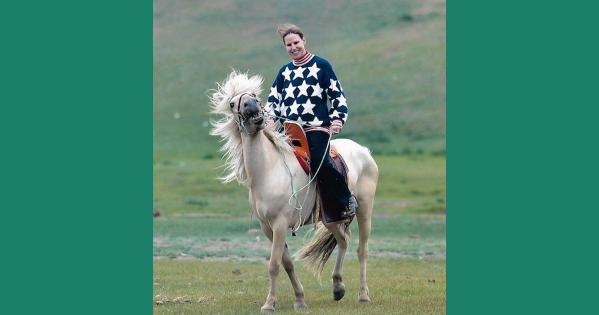Ambassador Piper Campbell Takes the Helm of USFP and GGPS Graduate Programs

This summer, Ambassador Piper Campbell began her new role as the administrative director of the Global Governance, Politics, and Security (GGPS) and the US Foreign Policy and National Security (USFP) graduate programs at SIS. Campbell, who served as the former US ambassador to Mongolia and the chargé d’affaires ad interim at the US Mission to the Association of Southeast Asian Nations, or ASEAN, has taught courses at SIS since spring 2020. With a distinguished 30-year career in the Foreign Service and previous career experiences that include serving as the CEO of a global strategic consulting firm, Campbell possesses a combination of abundant diplomatic and business experience and provides USFP and GGPS students a leader rich with practical skills and knowledge to share.
Beginning Her Diplomatic Journey
Campbell developed an early desire to travel and interest in experiencing different cultures. In high school, she studied abroad in Japan, and after returning to her hometown of Buffalo, New York, she continued to take Japanese language courses through her local college. She gained even more experience abroad by working one summer as a waitress in France and volunteering in Buffalo with an organization that worked to expand American economic ties with Canada.
“I think that the range of my international exposure—Japan, France, and Canada—really helped set me up to become a Foreign Service Officer,” says Campbell.
The process for becoming a Foreign Service Officer can be rigorous and competitive, but Campbell’s humble approach to the Foreign Service Officer Test (FSOT) and application process helped her land the position on the first time she applied: “Especially during the oral exam, I really listened to the questions. I wasn’t trying to show off—rather I was trying to provide genuine answers. There was a part where we had a group exercise, and I approached that from a problem-solving perspective. I wasn’t trying to win; instead, I was trying to see how we could have the best outcome for the group.”
Serving as the Ambassador of Mongolia
President Barack Obama nominated Campbell as the US ambassador to Mongolia in 2012, and she served in the role through 2015. Campbell realized it was important not only to become an expert on the US-Mongolia relationship but also to develop a strong grasp on the relations between the US and China, Mongolia and China, and Mongolia and Russia. She spent much of her time in Mongolia working to understand how Chinese and Russian foreign policy impacted the country.
“The Mongolians say that they’re a little pony stuck between a dragon and a bear. They have to navigate relationships with their two big neighbors, on whom they are geographically dependent but with whom they are also economically enmeshed,” says Campbell.
Campbell learned that she also needed to understand Mongolia’s unique “third neighbor policy,” in which the Mongolian government works to forge relationships with the US, Japan, South Korea, and Canada.
To accomplish this, she drew upon experiences from her time as part of the UN peacekeeping mission in Croatia in 1986. During the Cold War, Croatia was part of the Socialist Federal Republic of Yugoslavia. Because Yugoslavia—and by extension, Croatia—and Mongolia were heavily influenced by their time within the orbit of the Soviet Union, Campbell’s experience in Croatia helped her understand Mongolian sentiments. She had also learned to read the Cyrillic alphabet while in Croatia, which helped her to communicate with and understand the Mongolian people, who use the same alphabet.
“I just fell in love with Mongolia. I fell in love with the culture and the people. I enjoyed the mental challenge of figuring out the strategic culture and trying to identify new ways to grow the US-Mongolia relationship,” says Campbell.
Applying Her Experiences in Diplomacy to Consulting and Teaching
Campbell’s time in the Foreign Service continues to inform how she works with clients in the consulting field and how she teaches students at SIS. Through her firm, Campbell Wind LLC, Campbell helps clients think globally—from advising a client on how to implement their technology internationally to encouraging another client to consider how their innovations can benefit humanitarian efforts.
As an SIS instructor, Campbell orients her teaching by asking a question: “How is this learning useful and applicable to the policymaking process?” She makes sure to use government sources as well as assign readings that include the national security strategies of different countries. When apt, she’ll share an anecdote from her time in the Foreign Service.
“When I started teaching, I made a promise to myself that I would not be a person who stood up in front of the class and just talked about my experiences. I really wanted to approach my classes from a rigorous academic perspective,” says Campbell. “I ask students to think about how policymaking processes and interests drive the behavior of other countries as well as how the history of the US shapes how we look at the world,” says Campbell.
Service has been a key part of Campbell’s State Department career, and SIS’s focus on service is what drew her to teach at the school. Having spent the majority of her teaching career at SIS holding classes remotely due to the pandemic, Campbell looks forward to being on campus more while serving as administrative director: “Taking on this new role, I’m excited to have more opportunities to interact with faculty and the school writ large as well as to see students more outside of the classroom.”
